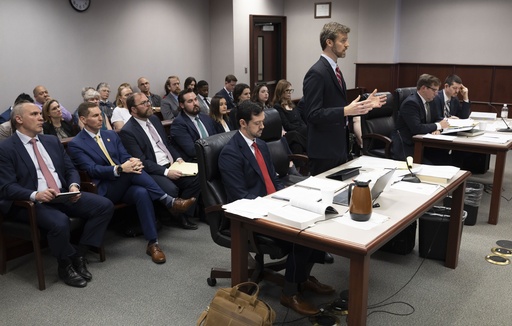RALEIGH, N.C. — A trial judge in North Carolina confirmed the decisions made by election officials regarding a contentious state Supreme Court election, upholding their rejection of a candidate’s protests to have a large number of ballots excluded from the final count.
On Friday, Superior Court Judge William Pittman issued three brief orders that supported the State Board of Elections’ earlier rulings from December concerning the close election. Democratic Associate Justice Allison Riggs leads with a margin of 734 votes over Republican challenger Jefferson Griffin, following the casting of over 5.5 million votes and the completion of two recounts.
Judge Pittman issued his ruling just hours after hearing arguments from attorneys representing Riggs, Griffin, and the State Board of Elections. This hearing marked another significant moment in the complicated legal landscape concerning the race, which remains one of the few unresolved contests from the elections held on November 5.
Griffin, who serves on the state Court of Appeals, lodged formal protests following the election, disputing around 66,000 ballots that were included in the tally. These protests were dismissed by the state board in December.
The legal team for Griffin contends that the State Board of Elections failed to comply with state laws and constitutional requirements during the ballot-counting process, particularly concerning three specific groups of voters. They aim to have these ballots excluded from the totals, asserting that this could potentially secure a victory for Griffin. In contrast, lawyers for Riggs and the board sought to maintain the integrity of the board’s prior decisions.
Judge Pittman’s orders, while largely similar, did not delve deeply into the specifics of the case. In one of his rulings, he stated, “The Court concludes as a matter of law that the Board’s decision was not in violation of constitutional provisions, was not in excess of statutory authority or jurisdiction of the agency, was made upon lawful procedure, and was not affected by other errors of law.”
Griffin’s protests have resulted in legal actions spanning both state and federal courts. Recently, attention shifted back to state court after a panel from the 4th U.S. Circuit Court of Appeals determined that Griffin’s claims should be addressed at the state level, highlighting contrasting interpretations of North Carolina law among the attorneys involved.
In a statement following the judge’s decision, Riggs described the outcome as “a victory for North Carolina voters and the rule of law,” while Griffin’s campaign spokesperson indicated plans for an appeal.
It is anticipated that the case will progress to the state Supreme Court. Riggs has recused herself from the deliberations, making the composition of the court significant, as five out of the six remaining justices are registered Republicans. However, Tuesday’s ruling from the 4th Circuit allows Riggs the option to return to federal court to argue her case regarding federal voting rights if the state court sides with Griffin.
Supporters of Riggs, including prominent Democrats and constituencies affected by Griffin’s legal challenges, have asserted that his attempts to alter the election results in North Carolina amount to an assault on democracy by disenfranchising eligible voters.
“North Carolina law and North Carolina courts have the power to protect democracy and the rights of the voters of this state,” Riggs’ attorney remarked during proceedings, emphasizing that state law contradicts Griffin’s claims.
The majority of contested ballots, about 60,000, were cast by voters who did not provide a driver’s license number or the last four digits of their Social Security numbers. A state law enacted in 2004 required these details, but Griffin’s lawyers maintain that the registrations are incomplete and blame the board for failing to specify the requirements adequately on registration forms over the years.
Riggs’ legal team and the board countered that there are justifiable reasons for the absence of these numbers, asserting that the voters are still legally registered. An affidavit from a board attorney suggested that around half of the disputed registrants actually supplied one number or the other.
Other challenged votes included those from numerous overseas voters who have never lived in the United States, as well as thousands of military or overseas voters who did not supply the necessary photo identification with their ballots.
Griffin’s attorney argued that the legislature did not intend to exempt overseas voters from photo ID requirements, insisting that the law should apply uniformly. However, attorneys for Riggs and the board contended that neither state nor federal laws mandate that military and overseas voters provide copies of identification. They also noted that Griffin’s challenges faltered on procedural grounds, as the Democratic majority of the board indicated that he failed to properly notify voters regarding their contested ballots.
Both Griffin and Riggs attended the hearing on Friday, and afterward, civil rights organizations held a press conference outside the courthouse that featured several voters affected by Griffin’s protests.
“No one should ignore this issue, as at any moment it could be your vote, your candidate, your values that are at stake,” expressed a Guilford County voter.



